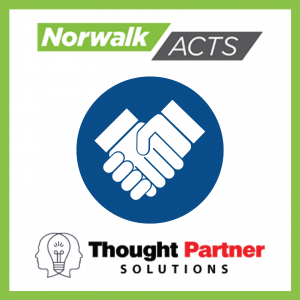
Norwalk ACTS proudly offered the community a series of free anti-racism workshops from their race equity consultants, Thought Partner Solutions, in 2020-2021. If you have an interest in learning more about a specific workshop, please email info@norwalkacts.org.
BEDI: Belonging, Equity, Diversity, & Inclusion
Advancing equity increases the prosperity, health, and safety of the entire community. In order to transform structures, organizations, communities, and systems, community leaders and residents need an equity lens focusing on the unique experiences of marginalized identities including People of Color, LGBTQ+, and Immigrants. This highly interactive training provides:
· A comprehensive framework and definitions of belonging, equity, diversity, inclusion (BEDI)
· An overview of the value of BEDI, community engagement, and why representation is important
· Practical strategies for advancing BEDI through inclusive town events, community dialogue, resident feedback, and town responsiveness.
The Emotional Liberation and Self-Care of BIPOC
Like trauma survivors, Black, Indigenous, and People of Color (BIPOC) experience fear, hypervigilance, self-blame, guilt, and a variety of health issues linked to the chronic stress and cumulative impact of racism. As a result of racism, BIPOC and White People often feel heightened levels of stress and emotion when interacting with one another, concerns that they will be the subjects of discrimination and hostility, and increased anxieties. This workshop discusses the root causes of racial trauma and racial anxiety and offers participants strategies for emotional emancipation, self-care, and wellness.
Managing Unconcious Bias
Gathering diverse stakeholders for community conversations is an important strategy for healing racial divides and building trust among different racial and ethnic groups. The fact that we have complex cultural identities and a host of differing past experiences increases the probability of cross-cultural miscommunications. This workshop provides an in-depth focus on the impact bias, stereotypes, and prejudice can have on people. We will spend time exploring how our own cultural views create assumptions that impact the way we see and respond to others and how this can raise unnecessary hurdles in our cross-cultural communication with others. We will also share strategies for responding to situations where stereotypes are used.
Everyday Racism
Participants will gain an understanding of racial prejudice, stereotypes, the invisible experience, and everyday situations dealing with racism. Participants will learn the pillars of antiracism and how to apply anti-racism strategies to policies, practices, programs, evaluation, and financial decisions that advance equity in practical, tangible ways. Through exercises, discussions, and presentations, participants will strengthen their knowledge of strategies and tools to achieve racial equity. We will explore a framework for racial justice efforts that move beyond merely valuing racial diversity to creating racial equity.
How to Be an Affective Ally for Change
Changes must be effective, behavioral, and cognitive at the individual level to begin to create systemic change. Participants will learn how to go from apathetic to aware to active to advocacy by developing ally skills by looking for opportunities to act, inform oneself, engage in activism, listening, and empowering others. Participants will engage in hands-on activities, group discussions, and role modeling exercises.
Building a Culture of Inclusivity
For organizations to truly be successful in their diversity work, there has to be a cultural change in the organization. However, culture change and culture building are not easy initiatives and HR professionals need training on how to strategically bring about culture change in the organization. In this session, participants will learn the pillars of organizational culture, how their personal identities affect organizational culture, and what they can do to create environments that foster inclusion and belonging.
Leading with a Racial Equity Mindset
When racial equity is not explicitly brought into operations and decision-making, racial inequities are likely to be perpetuated. Racial equity tools provide a structure for institutionalizing the consideration of racial equity. Using a racial equity lens allows participants to talk about race courageously and make the invisible visible. This workshop will provide opportunities for leaders to immerse themselves in readings, dialogue, and collective work around issues of race, ethnicity, and equity using Thought Partner Solutions’ RE-ACT for Change Framework
Community Engagement for Racial Equity
As an organizational leader, advancing racial equity will require outreach and engagement with diverse communities in meaningful ways. In this workshop, Jamal Jimerson of Thought Partner Solutions will introduce strategies for five levels of community engagement, civic engagement, and inclusive decision making. Participants will engage in meaningful discussion about case studies in community engagement, learn some basic community conversation guidelines, and discuss strategies for building decision-making opportunities.
Guide to Crafting to Anti-Racist Communications
With the recent events in our country, including the racial inequities highlighted in the Covid-19 crisis and the racist murders of Ahmaud Arbery, Breonna Taylor, and George Floyd, the nation yet again faces the challenging work of confronting anti-Black racism. Many companies and organizations have released statements condemning racism, declaring solidarity with the Black community, and reinforcing their commitment to racial equity. In this workshop, TPS provides insight and guidance about how to craft effective anti-racist communications for internal and external audiences.
